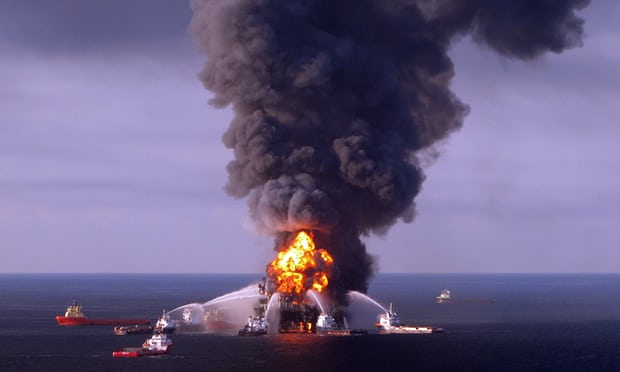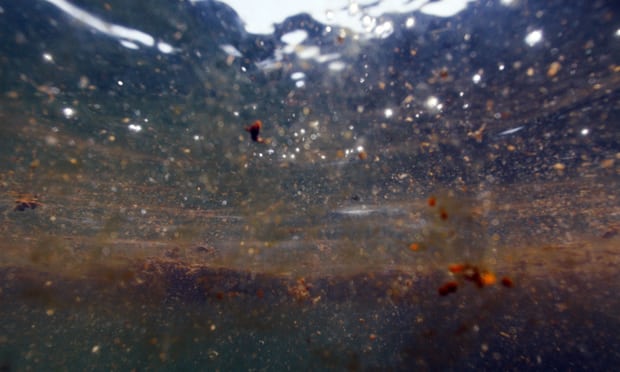Deepwater Horizon Disaster Altered Building Blocks of Ocean Life
ENVIRONMENT, 2 Jul 2018
Oil spill disaster reduced biodiversity in sites closest to spill, report finds, as White House rolls back conservation measures.

Response crews battle fire on BP-operated oil rig Deepwater Horizon in the Gulf of Mexico on 21 April 2010. Photograph: HO/AFP/Getty Images
28 Jun 2018 – The 2010 Deepwater Horizon oil spill disaster may have had a lasting impact upon even the smallest organisms in the Gulf of Mexico, scientists have found – amid warnings that the oceans around America are also under fresh assault as a result of environmental policies under Donald Trump.
Lingering oil residues have altered the basic building blocks of life in the ocean by reducing biodiversity in sites closest to the spill, which occurred when a BP drilling rig exploded in April 2010, killing 11 workers and spewing about 4m barrels of oil into the Gulf.
Researchers took sediment samples in 2014 from shipwrecks scattered up to 150km (93 miles) from the spill site to study how microbial communities on the wrecks have changed. On two shipwrecks close to the source of the outpouring of oil – a German U-Boat and a wooden 19th-century sailing vessel – scientists saw a visible oil residue.
“At the sites closest to the spill, biodiversity was flattened,” said Leila Hamdan, a microbial ecologist at the University of Southern Mississippi and lead author of the study. “There were fewer types of microbes. This is a cold, dark environment and anything you put down there will be longer lasting than oil on a beach in Florida. It’s premature to imagine that all the effects of the spill are over and remediated.”

Patches of oil from the Deepwater Horizon spill are seen from an underwater vantage in the Gulf of Mexico on 7 June 2010.
Photograph: Rich Matthews/AP
The BP oil disaster fouled more than 1,300 miles of coastline, caking seabirds and killing sea creatures and other wildlife, leading to huge financial losses for the tourism and fishing industries. But Hamdan said the oil’s impact on microbes, each measuring just a fraction of a millimeter, could prove even more significant given their foundational role at the base of the ocean food chain.
“We rely heavily on the ocean and we could be looking at potential effects to the food supply down the road,” she said. “Deep sea microbes regulate carbon in the atmosphere and recycle nutrients. I’m concerned there will be larger consequences from this sort of event.”
The findings, published today, come as the Trump administration dismantles ocean conservation measures put in place by former president Barack Obama in the wake of the Deepwater Horizon calamity.
Last week, Trump issued an executive order that essentially revoked an Obama directive that established the National Ocean Council to “ensure the protection, maintenance and restoration” of the oceans and the Great Lakes.
Trump’s order, which does not mention the Deepwater Horizon spill, hands more responsibility to the states for drilling safety and frames environmental protections as a potential barrier to industries that “enhance America’s energy security”. The president said he was “rolling back excessive bureaucracy created by the previous administration” with his order.
Congressional Republicans and industry groups cheered the move, which follows Trump’s sweeping expansion of offshore areas, including the Arctic, available for drilling. Jack Belcher, managing director of the pro-industry National Ocean Policy Coalition, said Trump’s order removes “a significant cloud of uncertainty” for businesses.
But conservationists are appalled. Christy Goldfuss, a former environmental adviser to Obama, said Trump is waging an “all-out war on America’s oceans”.
“Trump is trying to wash his hands of responsibility for the real and urgent threats facing America’s coastal communities – namely, the impacts of climate change,” said Goldfuss, who is now a senior vice-president at the Center for American Progress.
“In the absence of a president who is willing to lead, it is now more important than ever that coastal governors, tribal leaders, state legislatures and local communities take up the mantle of leadership and work together to defend and restore the health of America’s oceans.”
_________________________________________
 Oliver Milman is an environment reporter for Guardian US.
Oliver Milman is an environment reporter for Guardian US.
Go to Original – theguardian.com
DISCLAIMER: The statements, views and opinions expressed in pieces republished here are solely those of the authors and do not necessarily represent those of TMS. In accordance with title 17 U.S.C. section 107, this material is distributed without profit to those who have expressed a prior interest in receiving the included information for research and educational purposes. TMS has no affiliation whatsoever with the originator of this article nor is TMS endorsed or sponsored by the originator. “GO TO ORIGINAL” links are provided as a convenience to our readers and allow for verification of authenticity. However, as originating pages are often updated by their originating host sites, the versions posted may not match the versions our readers view when clicking the “GO TO ORIGINAL” links. This site contains copyrighted material the use of which has not always been specifically authorized by the copyright owner. We are making such material available in our efforts to advance understanding of environmental, political, human rights, economic, democracy, scientific, and social justice issues, etc. We believe this constitutes a ‘fair use’ of any such copyrighted material as provided for in section 107 of the US Copyright Law. In accordance with Title 17 U.S.C. Section 107, the material on this site is distributed without profit to those who have expressed a prior interest in receiving the included information for research and educational purposes. For more information go to: http://www.law.cornell.edu/uscode/17/107.shtml. If you wish to use copyrighted material from this site for purposes of your own that go beyond ‘fair use’, you must obtain permission from the copyright owner.